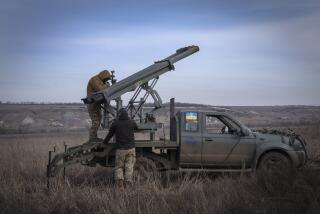Lugar Focuses on Russian Disarmament
- Share via
MOSCOW — Despite shortcomings in Russian cooperation on arms control, U.S. funding for the destruction of Soviet-era weaponry should proceed unimpeded, the chairman of the Senate Foreign Relations Committee said here Friday.
“Our objective, and the Russian objective at the highest level, is to destroy weapons of mass destruction,” Sen. Richard G. Lugar (R-Ind.) told a news conference. “It is not useful to set up conditions that there must be 100% compliance before we do anything.”
Out of 44,000 tons of chemical weapons that Moscow has acknowledged producing during Soviet times, only about 400 tons have been destroyed, Lugar said. And despite improved security at Russian arms depots, the risk of such weapons falling into terrorist hands is a significant threat, he added.
Comparing Russia’s situation concerning chemical weapons with Iraq’s, Lugar said: “To the extent the Iraqis have destroyed everything they ever produced, that simply puts them well ahead of where Russia is. We still have 39,600 [metric] tons to go, at enormous expense that cannot be sustained by the economy of this country presently, and that is why we are involved in attempting to accelerate the process.”
Lugar is in Russia for talks with government officials about the Cooperative Threat Reduction program, under which the United States has spent about $7 billion to help destroy nuclear warheads, ballistic missiles, bombers, submarines and other weapons in former Soviet states.
The senator met Friday in Moscow with Munitions Agency Director Viktor Kholstov to discuss joint efforts to accelerate the elimination of chemical weapons.
Today, Lugar is scheduled to fly to Perm, about 700 miles east of Moscow, to observe the U.S.-financed destruction of mobile SS-24 and SS-25 intercontinental ballistic missiles that once threatened the United States.
At his news conference, Lugar criticized members of Congress who have tried to attach conditions to U.S. funding of the weapons destruction program. He also complained that Russian officials played into those critics’ hands by being less than forthcoming about what might be left over from the Soviet Union’s biological weapons program.
“Some members of Congress say, ‘Is Russia complying, literally, to the dotted line, with all arms control treaties? There can’t be cheating going on on the side while American taxpayer money is going in,’ ” Lugar said. “There is almost every year a dispute over whether Russia is complying with every aspect of this.”
He said another battle over conditions for funding -- and the approval of waivers allowing the president to ignore those conditions -- was likely next month.
Lugar placed particular emphasis on a plant being built in the Siberian town of Shchuchye to destroy nearly 1.9 million chemical artillery shells stored there. Many are small enough to fit in a suitcase, he said. Just one of those shells can kill thousands of people, according to materials distributed at the news conference.
U.S. funding has helped bring enormous improvements in security at Russian weapons depots, but major risks remain, Lugar added.
The United States should “be active with Russian friends to destroy all of this so it cannot be appropriated by others, whether it be Chechens or Al Qaeda or whoever else might want to pick up a few,” he said.
Security at Shchuchye and many other sites is strong enough to protect the chemical weapons against “passersby or a few persons who are out for mischief,” he said, but there is a potential risk from armed attack as long as the weapons exist.
Lugar complained that Russian officials were still in denial over the Soviet Union’s biological weapons program and what might remain from it. “I heard the phrase again yesterday in conversation: ‘Sen. Lugar, you must understand, we do not have any biological weapons,’ ” he said.
“The United States believes that there were four installations that are military bio-facilities,” he said. “Now, conceivably, the general who visited with me yesterday may be correct that at all four of these, there is not a single weapon at this moment. There may be pathogens in an icebox. The fact is, we don’t know.”
More to Read
Sign up for Essential California
The most important California stories and recommendations in your inbox every morning.
You may occasionally receive promotional content from the Los Angeles Times.













